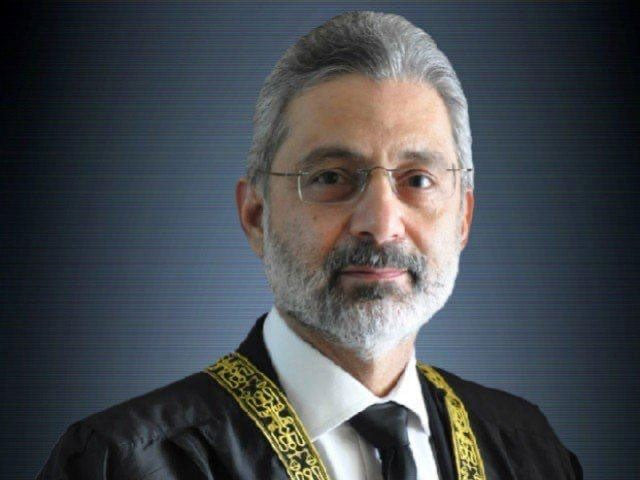Justice Isa urges JCP to evolve criteria for judicial appointments
AGP to raise the issue for restructuring the process and setting criteria for elevations during JCP’s meeting

Ahead of the Judicial Commission of Pakistan’s (JCP) January 6 meeting to consider the elevation of Justice Ayesha A Malik to the Supreme Court, Justice Qazi Faez Isa has called on the commission to evolve criteria for the appointment of superior court judges.
Sources revealed to The Express Tribune that Justice Isa, who is also a member of the JCP, has written a two-page letter to all members urging them to set criteria for the appointment of SC judges.
The justice questioned Rule 3 of the Judicial Commission of Pakistan Rules, 2010. The rule lays down the process for judicial nominations makes no mention of the words ‘senior-most' judge’ for the appointment and grants discretionary power to the Chief Justice of Pakistan (CJP) to initiate the name of high court judge for appointment to the SC and high courts.
The January 6 session of the JCP was summoned after the CJP once again proposed the name of Justice Ayesha A Malik for elevation. On September 9, a lack of consensus forced the commission to defer the appointment of Justice Malik to enter the Supreme Court as the first-ever woman judge in the country’s judicial history.
Read Why JCP didn’t choose senior SHC judges
In his letter, justice Isa referred to Article 175-A of the Constitution which does not permit CJP to exercise 'unfettered discretionary power' to nominate high court judges for the apex court.
During the last meeting, Justice Maqbool Baqar - another JCP member - also urged the commission members to evolve criteria first before initiating the name of Justice Ayesha Malik.
The sources further revealed that the issue for restructuring the process and setting criteria would be raised by Attorney General for Pakistan Khalid Jawed during the JCP’s meeting scheduled to be held on January 6.
The AGP had already written a letter to superior bars for this purpose.
According to the AGP, multiple factors are taken into consideration for the performance evaluation of high court judges, some of which may be mathematically determined on the basis of available data while other factors would be informed by general evaluation and perception.
"These could include reputation and public perception about integrity, independence and impartiality, health condition, length of service, number of cases heard and judgments delivered, number of cases heard but judgments not delivered, average duration between final hearing and delivery of judgement, commitment to constitutional values and fundamental rights, range and diversity of work, expertise in a particular area, command over language, temperament and demeanour towards colleagues, the bar and the litigants etc," he added.
“Being a representative of the legal fraternity in your respective capacity … you are requested to convey the views of the legal fraternity on this subject.”
It is also learnt that former Sindh High Court Bar Association president Salahuddin Ahmed is going to issue a white paper on judges appointments today (Wednesday).
He has already moved a constitutional petition with a prayer that Rule 3 of the Judicial Commission of Pakistan Rules, 2010 regarding discretionary powers of Chief Justice of Pakistan (CJP) may be set aside, the process of appointment of judges to superior judiciary be restructured and elevation of judges from high courts to the apex court be made by adhering to the principle of seniority for smooth functioning of the judiciary in the interest of justice.
JCP is responsible for the appointment of judges to the Supreme Court and five high courts of the country. The CJP also heads the commission as its chairman.
The body also comprises four senior-most judges of the Supreme Court, a former judge, the federal law minister, the attorney general for Pakistan and a senior advocate nominated by the Pakistan Bar Council.
The provincial and Islamabad bar councils each nominate a representative as a JCP member.
Last year, superior bars staged a protest and boycotted Supreme Court proceedings on the occasion of the JCP meeting to consider the nomination of Lahore High Court’s Justice Ayesha Malik for her appointment as an SC judge.
Read JCP asked to appoint females as superior courts’ judges
Later, CJP Gulzar in his speech on the eve of the new judicial year said the protest organised by the lawyers’ community on September 9 against the appointment of junior judges to the SC was “uncalled for”.
The CJP said even though he was “always” ready to meet the representatives of the lawyers’ community for an amicable solution to their problems, this time no one had approached him for the appointment of judges.
Khyber-Pakhtunkhwa Bar Council representative Ahmed Farooq in the JCP wrote a letter to the CJP to accept his invitation for dialogue.
Later, the representatives of superior bars were invited to meet the CJP on October 20.
During the meeting, the chief justice had agreed to notify a committee of JCP members to consider the superior bars’ proposals for amendments to the commission’s rules. It is learnt that the CJP might summon a full house meeting of the commission to discuss the proposed amendments to the JCP Rules 2010. However, nothing was done in this regard.
The PBC has proposed a number of amendments to the JCP rules, calling for transferring discretionary powers on the appointment of superior court judges from the chairman to the commission.



















COMMENTS
Comments are moderated and generally will be posted if they are on-topic and not abusive.
For more information, please see our Comments FAQ